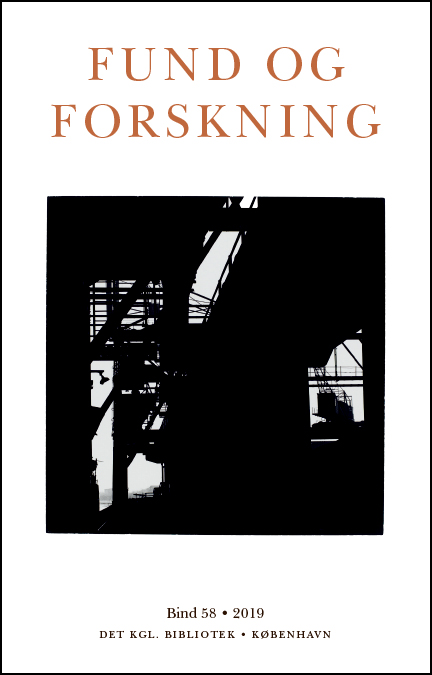Landkort over en samling. Hvad katalogposterne kan fortælle om Otto Thotts håndskriftsamling – og om katalogisering
DOI:
https://doi.org/10.7146/fof.v58i0.125301Abstract
Anders Toftgaard: Mapping a collection. What the catalogue records can tell us about Otto Thott’s manuscript collection and about manuscript cataloguing.
This article deals with the manuscript collection of Count Otto Thott (1703-1785) and with manuscript cataloguing. Otto Thott was the single greatest private book collector in the history of Denmark and of inestimable importance for the Royal Danish Library, since he bequeathed his collection of manuscripts (4154 catalogue numbers) and books printed before 1531 (6059 catalogue numbers) to the Royal Library. In the manuscript collection, the inclusion of his collection marks the division between the Old Royal Collection (GKS) and the New Royal Collection (NKS). Many of the treasures in the rare books collection come from his library, and his definition of paleotypes (books printed before 1531) has (in the 20th c.) determined the definition of the collection of post-incunabula.
Otto Thott did not write owners’ marks or notes in his books and he left very little archival material concerning the ways in which he created his library. Regrettably, the literary correspondence mentioned in his will has not survived.
The article analyses a data set consisting of all catalogue records (in MARC format) concerning manuscripts from Otto Thott’s manuscript collection. These catalogue records in the library system derive from the catalogue made by Rasmus Nyerup (excluding oriental manuscripts) and published in 1795. When, towards the end of the 19th centrury, the alphabetical and the systematical catalogues of the collection of western manuscripts were produced, the entries in Nyerup’s catalogue were copied by hand without being revised. After the IT revolution, when the catalogue records of the systematical catalogue were transferred to a digital database of records, these records were copied once again without revision. It is shown what kind of errors from the catalogue of 1795 were still present in the on line catalogue in 2019.
The quantitative analysis shows that the bulk of the manuscripts in Thott’s manuscript collection are manuscripts in Danish and German from Thott’s own century. The subject headings with most entries are Theology, History, History of Denmark, Danish Biography and Literature. As to provenances there is information concerning the manuscript’s provenance before the inclusion in Otto Thoot’s library in 17 % of the catalogue records.
The analysis shows that Otto Thott’s manuscript collection was a universal collection with no specific preferences. The conclusion argues that it is necessary to get information from the various printed catalogs of the manuscript collection into the digital library system and that parts of Thott’s manuscript collection deserve revisiting and recataloguing. The Royal Danish Library’s manuscript collection might explore alternatives to the MARC-format for manuscript cataloguing. In a wider context, it is argued that Otto Thott’s library should be considered a knot in a network, and that data from the many book auction catalogues should be extracted and used for mapping the destinies of specific books and manuscripts.


